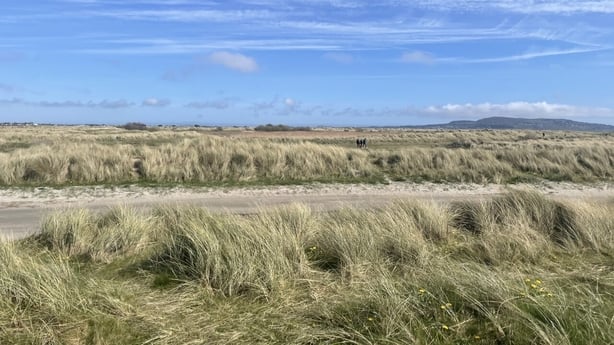Dublin City Council recently announced a new visitor access management plan for North Bull Island to protect biodiversity on the island.
The plan, which is proposed by Dublin City Council, requires people not to access the salt marsh or northern tip of the island, which will be left undisturbed.
According to the council, the salt marsh is where migratory birds feed and roost, so that they can build up crucial fat reserves for their long migratory journeys.
In addition, dog walkers will be required to keep their dog on a lead in the dunes to prevent disturbance to ground nesting birds.
A designated area of the beach will be available for dogs off-lead outside of the bathing season and bathing hours.
Speaking on RTÉ's This Week programme, Green Party Councillor Donna Cooney said different zones will be marked with signage and colour-coding across the island.
"There's red zones where dogs and people shouldn't go at all, we're asking people to stay away from those to protect wildlife because they are sensitive areas where you have ground nesting and feeding birds and also the seals and their cubs on the farther end of the island," she said.
"If they get disturbed it can affect their breeding numbers if they don't feed enough. They need as much food as they can to sustain them. There's going to be restrictions for dogs, they will need to be kept on their lead in nearly all areas of the island.
"We don't just have one habitat; we have multiple habitats. We have the salt marshes, we have the coast, we have the dunes and we're going to have new park wardens now that are being hired and they'll be there seven days a week."
In the past, Bull Island had its own sub-species of hare, and restrictions on dogs running loose were signposted and backed by a dog warden. There are now no hares on Bull Island.

Oonagh Duggan, head of advocacy at Birdwatch Ireland, said she hopes the measures will work this time around.
"I've been sitting here looking out and in about five minutes, three people have arrived with their dogs unleashed and the minute they see the wetlands, the salt marsh area, the dogs are left off," she said.
"So it's very worrying because these wintering waterbirds come from Canada, Greenland and Iceland to spend the winter here with us, and they need to be free from disturbance in order to be fit to fly home so they can start the breeding season.
"So, we very much welcome Dublin City Council stepping up to put some measures in place and we would really hope that the residents in the local areas and the people who come to Bull Island will actually adhere to them. But unfortunately, our experience in the past, because this was trialled, I think 25 or 30 years ago and at the time it didn't work," Ms Duggan said.
Some local people and visitors have said that while steps need to be taken to protect biodiversity on Bull Island, they would still like some space for dogs.
One member of the Dollymount Dames said: "It's just that worn little patch of land. It's down at the where the Sea Scouts are and where the homes are, where the people live.
"It's just that little field just there just in front of that, that people bring their dogs and let them have a run ... obviously not during nesting season. I just wondered why they just couldn't have left that little bit."
We need your consent to load this rte-player contentWe use rte-player to manage extra content that can set cookies on your device and collect data about your activity. Please review their details and accept them to load the content.Manage Preferences
A weekly visitor to Bull Island said: "I think it's important to preserve nature, to be honest people I think are sometimes a bit disgusting. You know, they leave litter more or less everywhere.
"I come here like on a weekly basis and just seeing the state of nature. It's just not good. So I would agree. As long as we have a little bit, you know, we can bring the dogs and enjoy a bit of the beach."
"The dogs running wild and free, I don't think it's on and I think biodiversity is much more important than having the dogs running," a local woman said.
"We haven't seen curlews at all in recent times and there used to be all loads and loads of curlews around here, but there thing in the past. Well, it's because of the climate change and whatever changes have occurred, I'm sure biodiversity has had a huge effect on all this."
The new measures, which are based on a voluntary code, are due to come into effect on 30 April.
However, Ms Duggan believes a monitoring program needs to be set up.
"We'll have to wait and see. A proper monitoring program needs to be established before and after to determine how it's working ," she said.
"A proper scientific monitoring program is needed to show whether this is working or not, and for results to be presented within six months. Our biodiversity is declining as we know.
"The Citizen's Assembly has just produced this raft of recommendations highlighting the problems for biodiversity in Ireland. A total of 63% of Ireland's wild bird species are already red and amber listed birds of conservation concern due to human activities and you know, we just will have nothing left if we keep going the way we are."







